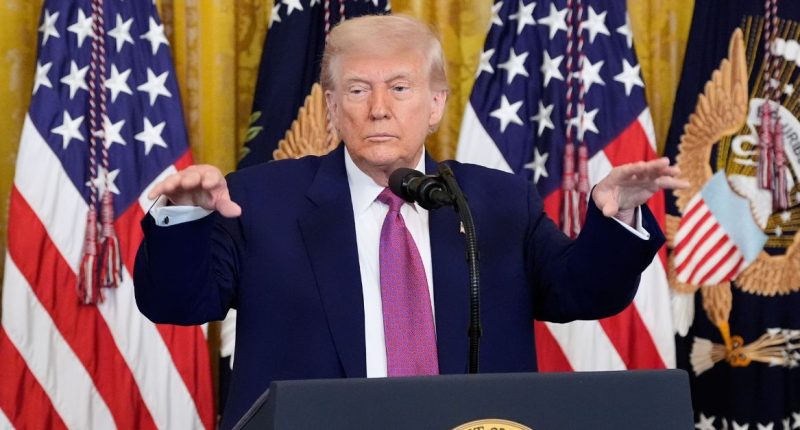Share this @internewscast.com
President Donald Trump addresses the signing of legislation to block California’s rule prohibiting the sale of new gas-powered vehicles by 2035, in the East Room of the White House, Thursday, June 12, 2025, in Washington (AP Photo/Alex Brandon).
A judge involved in a lawsuit against the Trump administration’s foreign aid reductions has instructed the government to reply to claims that several agencies and officials “have made plans to take actions that would violate” a prior court ruling in the case.
On the first day of his second term, President Donald Trump aimed to all but halt foreign aid initiatives managed and financed by USAID and the State Department. Through executive orders along with subsequent policy directives and memorandums, the 45th and 47th president, along with various cabinet members, sought to implement this agenda. Within a few weeks, thousands of grant awards were suspended or canceled, although some projects received exemptions.
The plaintiffs had previously secured a temporary restraining order through an opinion from U.S. District Judge Amir H. Ali, a Joe Biden appointee. This relief was brief, as the U.S. Court of Appeals for the D.C. Circuit, in a split decision, determined the plaintiffs lacked a cause of action.
Unfazed, the plaintiffs swiftly revised their lawsuit and requested the trial court judge’s approval to sue again, which was immediately granted, hinting at future developments. Then, in under a week, Ali provided the plaintiffs with another temporary restraining order and a preliminary injunction, along with a partial summary judgment on the merits.
Currently, the plaintiffs, comprising a coalition of financially constrained grantees and associations, claim to have obtained “information that raises serious questions” regarding the Trump administration’s actions.
The plaintiffs leveled the accusation over the weekend in a 22-page motion to show cause on compliance with the preliminary injunction.
Under the terms of the injunction, the government must spend “expiring funds Congress appropriated” in 15 specific categories related to higher education, as well as certain funds obligated to the State Department and foreign aid in a 2024 spending bill.
“[I]t appears that Defendants have made plans to take actions that would violate the injunction,” the motion reads. “Most notably, Defendants apparently intend, through accounting maneuvers, to utilize the appropriations in [a “special message” from Trump to Congress] to get out of complying with the directives.”
To hear the plaintiffs tell it, the government plans to “attribute” the funds as directed without actually spending them – essentially an “accounting maneuver” that gives the appearance of compliance.
The allegation, of course, necessarily entails some complex mathematics and is attributed to a State Department official.
The motion also contains other allegations – including a claim that the government is being cagey about its plans for congressionally outlaid funds from prior budgetary years and concomitant spending bills.
“The injunction does not differentiate in any way between the requirements of the 2024 Appropriations Act and those of prior acts,” the motion reads. “Defendants must obligate expiring funds from all of these laws.”
On Tuesday, Ali issued a six-page order telling the government to explain itself – while also telling the plaintiffs they made a few too many demands in light of a partial stay issued by U.S. Supreme Court Chief Justice John Roberts earlier this month.
Specifically, the court wants to know the status of the prior appropriations acts issue. The court’s order stated that the accounting gimmick allegation is beyond its jurisdiction due to the high court’s stay.
From the order, at length:
Plaintiffs state that Defendants still have not provided any information regarding foreign aid funds expiring on September 30, 2025, from pre-2024 appropriations acts. Defendants respond that they intend to obligate all expiring funds not included in the rescission proposal and that Plaintiffs are not entitled to “real-time monitoring.” The point is well taken, but the Court notes that Defendants previously provided a summary of expiring appropriations for the 2024 act, and Plaintiffs appear to be seeking no more than that as it relates to prior acts. Because the injunction—including the portions not subject to a stay—covers prior appropriations acts, confirmation of what will be obligated, at the same level of generality as Defendants’ prior summary, is appropriate. Indeed, such information will aid in clarifying which appropriations and earmarks from prior acts are and are not implicated by the rescission proposal, so as to ensure that any disputes about funds from prior acts relate to the operative parts of the injunction and do not infringe on the partial stay.
The government has until Sept. 25 to comply with the court’s order.















